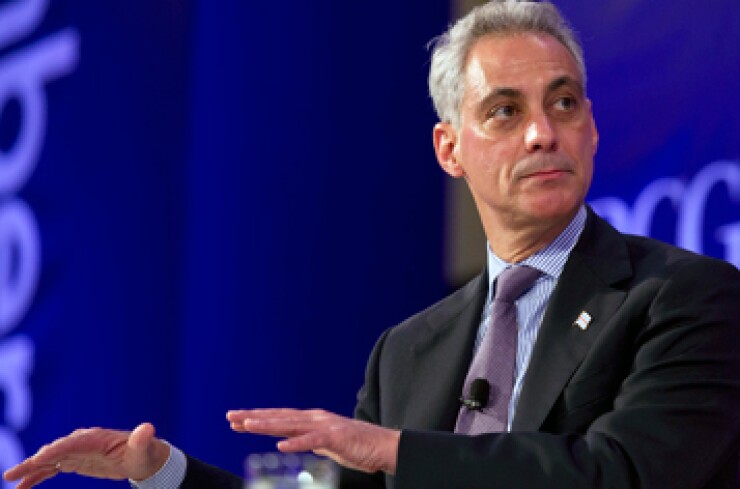
CHICAGO - Chicago's $1.1 billion general obligation debt restructuring cleared the City Council Finance Committee Monday after a two-hour hearing during which new chief financial officer Carole Brown defended plans to roll short-term operating expenses on to the city's long-term debt load.
Brown, tapped last month by Mayor Rahm Emanuel to take the city's financial reins after the departure of Lois Scott, labeled the refinancing debt "clean up" bonds. They allow the city to eliminate the remaining general obligation-related portion of a $2.2 billion liquidity headache triggered by Moody's Investors Service recent junking of the city's $8.9 billion of GOs, sales tax, and motor fuel bonds and its lowering of water and wastewater bonds.
"It's a critical step" toward restoring the city's fiscal stability by simplifying its balance sheet and eliminating bank related risk on its GO credit profile, Brown told the committee.
The downgrades triggered default events that permitted banks to demand repayment of debt tied to floating-rate paper, swaps, and the city's short-term commercial paper and credit lines. The city struck forbearance agreements in which banks agreed not to demand repayment. The liquidity threat prompted Fitch Ratings and Standard & Poor's to also lower the city's rating.
The city in recent weeks shed more than $900 million of the potential problem by shifting floating-rate debt over to a fixed-rate, jettisoning the letters of credit and bank facilities that fell into default after the downgrade.
"We must continue to act expeditiously to avoid future capital calls of over $900 million," Brown told the council members during her first appearance before the committee as CFO. "Now it's time to reduce the balance. The bonding authorization now heads to the City Council which meets Wednesday.
Brown said the city has few choices. "I think it's untenable," she said of leaving the short term paper outstanding with forbearance agreements that expire Sept. 30 hanging over the program.
The city intends to move about $800 million of debt in its short-term borrowing program into a long term, fixed-rate structure, piling it on to a more than $8 billion debt load.
The remainder of the up to $1.1 billion borrowing authorization will cover $170 million of capitalized interest costs over the first two years providing further budget relief. The city will use $180 million to cancel a 2005 leveraged lease transaction involving a light-rail line that serves Midway Airport. The Moody's default triggered a default on city's letter of credit reimbursement contract with PNC Bank.
Some outstanding debts in the short term program cover costs incurred as part of the city's effort to shed liquidity risks tied to the downgrade. They include $200 million to terminate GO related interest-rate swaps and $150 to cover a portion of the city's conversion of four floating-rate tranches to a fixed-rate over the last month.
The move eases pressures on the city's general fund as other debts covered with short term borrowing such as $75 million for a retroactive pay raise, $62 million for a legal judgment related to its parking garage lease were be rolled into long term debt. Another $170 million that was tapped in 2014 as part of the city's scoop-and-toss practice of pushing some principal off for budget relief also is being rolled into long term debt.
The city will return later this year with a new money and refunding issue that will include more scoop-and-toss refinancing. Emanuel recently said he would phase out the practice by 2019 and would reduce the level of such operating expenses as legal judgments pushed on to the city's long term debt load.
Brown portrayed the restructuring as laying the groundwork to help the city tackle tough decisions ahead, as the city addresses a $550 million spike in public safety pension contributions due next year and could face an adverse court decision on an overhaul of its other two pension funds. The city's $20 billion of unfunded pension obligation spurred its credit deterioration.
Morgan Stanley is senior manager on the transaction that the city hopes to complete by mid-July. The firm in May entered into an agreement with the city increasing an existing $100 million credit line to $300 million.





